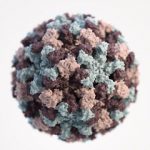Possible Coronavirus Cure Found in China
 It appears in China, doctors found a working cure for Coronavirus infections, at least it works with the patients they studied. Thankfully it appears the physicians in China have found a breakthrough. An IV dose of about 200mg per kg body weight per day appears to suffice to clear symptoms rather quickly. For an average 75 kg person, that’s just 15 grams per day via IV. A similar result could perhaps be achieved by taking 2 grams of Vitamin C orally every hour for 24 hours.
It appears in China, doctors found a working cure for Coronavirus infections, at least it works with the patients they studied. Thankfully it appears the physicians in China have found a breakthrough. An IV dose of about 200mg per kg body weight per day appears to suffice to clear symptoms rather quickly. For an average 75 kg person, that’s just 15 grams per day via IV. A similar result could perhaps be achieved by taking 2 grams of Vitamin C orally every hour for 24 hours.
The article below was published by the National Medical Team of the Second Affiliated Hospital of Xi’an Jiaotong University in China, and translated from Chinese, for the original see http://2yuan.xjtu.edu.cn/Html/News/Articles/21774.html
High-dose vitamin C treatment of new coronary pneumonia
On the afternoon of February 20, 2020, another 4 patients with severe neocoronary pneumonia recovered from the C10 West Ward of Tongji Hospital in the Tongji Hospital, which was taken over by the Second Aid National Medical Assistance Team of Xi’an Jiaotong University. The medical team was formally put into work. In the past 8 patients have been discharged from hospital.
After 10 days of practical exploration by the medical team and repeated discussions by the expert group, our expert group proposed a specific plan for the combination of high-dose vitamin C to treat the new crown, and achieved good results in clinical applications. Our treatment plan is generally summarized as “early, adequate, short course, combined.”
Early stage: The so-called “early stage” refers to the timely application of high-dose vitamin C in the early stages of the disease course. We believe that for patients with severe neonatal pneumonia and critically ill patients, vitamin C treatment should be initiated as soon as possible after admission. This is because no matter the past Keshan disease, SARS and Middle East respiratory syndrome, or the current new pneumonia, the main cause of death of patients is cardiopulmonary failure caused by increased acute oxidative stress. When the virus causes increased oxidative stress in the body and increased capillary permeability, early application of large doses of vitamin C can have a strong antioxidant effect, reduce inflammatory responses, and improve endothelial function.
Adequate: Adequate refers to the large amount of vitamin C. Numerous studies have shown that the dose of vitamin C has a lot to do with the effect of treatment. Our past experience in successfully rescuing acute Keshan disease and current studies at home and abroad show that high-dose vitamin C can not only improve antiviral levels, but more importantly, can prevent and treat acute lung injury (ALI) and acute respiratory distress (ARDS). .
Short-term: Short-term means that the medication time does not exceed 1 week. Short-term application of large doses of vitamin C in the critical period of disease progression can achieve twice the result with half the effort, and can significantly reduce the side effects such as kidney stones, hematuria and renal colic that should be brought in the long term, reduce nausea, vomiting, hypotension, tachycardia, etc Adverse reactions to avoid the body’s dependence on exogenous vitamin C caused by long-term medication.
Combination: Combination refers to the combination of other treatment methods in the treatment process to develop individualized treatment plans. New crown pneumonia treatment is still without specific drugs. In the just-released “New Crown Pneumonia Diagnosis and Treatment Program Sixth Edition”, it is recommended that active symptomatic treatment be based on early trials of antiviral therapy and oxygen therapy. Therefore, the clinical application of high-dose vitamin C must be combined with the patient’s situation and combined with other drugs and treatment methods, so that it is expected to improve the treatment of critically ill patients.
In addition, when using this regimen, it should be noted that due to the high concentration, it may irritate the blood vessels and cause pain. It is recommended that isotonic fluids be given to flush the blood vessels quickly after administration to reduce the irritation of the blood vessels. In addition, we use intermittent and slow administration. Helps maintain the effective concentration of blood vitamin C, and can also reduce the local stimulation of blood vessels to the greatest extent. Finally, because vitamin C may interfere with blood glucose monitoring results, patients with diabetes should avoid measuring blood glucose immediately after infusion.
Finally, based on the various pharmacological properties of vitamin C, this treatment should not be used in patients with the following clinical conditions: 1. Allergy to vitamin C; 2. Life expectancy less than 24h; pregnant and / or lactating women; tracheotomy Have or have a family history of oxygen therapy; 6. Interstitial lung disease, malignancy, diffuse alveolar hemorrhage, diabetic ketoacidosis, or a history of active kidney stones.